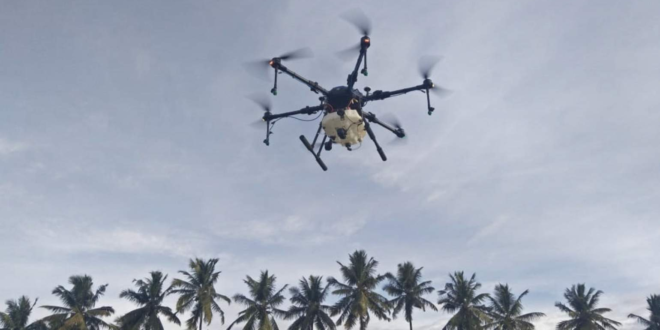Picture for representational purpose only | (Pic: Express)
With the exponential rise in drone usage across various sectors like industrial applications, agriculture, logistics and defence, the need for indigenous avionics systems has become crucial. In order to reduce the dependence on foreign drone technology, the Indian Institute of Science (IISC) has made a significant achievement in the field of unmanned aerial systems, stated a report in The New Indian Express.
The Artificial Intelligence and Robotics Laboratory (AIRL) at IISC announced that the team has successfully developed an indigenous industrial-grade autopilot system for drones. The team said this achievement is the initial step towards the indigenisation of avionics systems for drones in India.
This feat was possible through the utilisation of Indian-made Vega Microcontrollers, developed by the Centre for Development of Advanced Computing (CDAC), as part of the Digital India RISC-V Program (DIR-V).
The indigenously developed technology will help reduce the reliance on microcontrollers in future drone avionics projects. Professor Suresh Sundaram, Associate Professor at the Department of Aerospace Engineering, who headed the project said, “Our autopilot system, powered by Vega Microcontrollers, showcases the immense potential of homegrown solutions in the unmanned aerial systems domain. We are confident that this breakthrough will pave the way for further advancements in this field and contribute to the growth of the drone ecosystem in India.”
India imports components for UAV
India’s most used drone technologies which include an unmanned aerial system (UAV) that can help run a basic operation system and forward data to a navigation control unit are imported from China, USA, Israel, and several European countries.
The reason for India’s slow progress in this sector is due to the non-availability of essential indigenous electronics components like microcontrollers and sensors at a reasonable cost. The country also lacks a skilled workforce working on the UAV systems. Using imported tech comes with major security concerns such as hacking and data manipulation.
The country has been on a steady growth towards chip manufacturing and CDAC is a ray of hope in developing world-class microcontrollers. “This move will cut millions of dollars worth of electronics import over the years and make India self-reliant in terms of UAV technology,” said the laboratory.

 Unmanned Aerial Vehicle The latest drone news
Unmanned Aerial Vehicle The latest drone news




